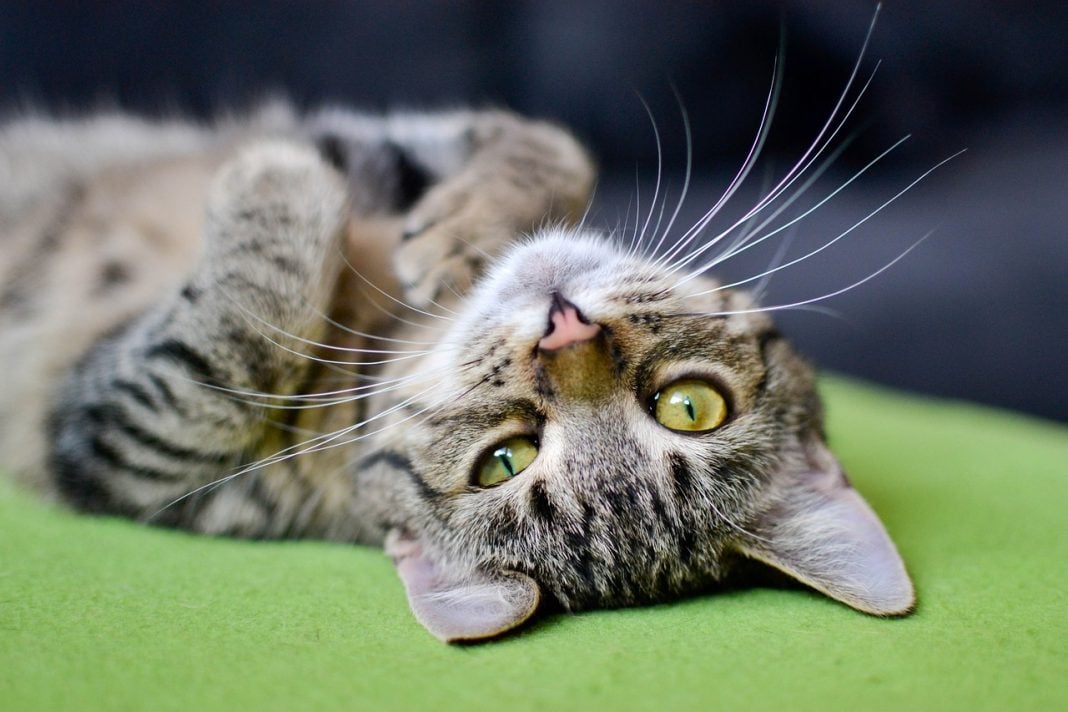Best Omega-3 Supplements for Cats? Omega-3 fatty acids are essential nutrients that can offer a plethora of health benefits for felines. From promoting a shiny coat and healthy skin to supporting joint health and cognitive function, these supplements are becoming increasingly popular among cat owners. In this article, we will delve into the top Omega-3 supplements available for your feline friend, helping you make an informed choice for your pet’s well-being. Whether you’re new to the world of cat supplements or seeking the best product, we’ve got you covered.
1. Pure Wild Alaskan Salmon Oil for Dogs and cats
Pure Wild Alaskan Salmon Oil is a liquid food supplement designed to support the skin and coat health of dogs and cats. It is rich in Omega-3 fatty acids, specifically EPA and DHA, which promote joint function, immune system health, and heart health. This product can be added to pet food as a topper and is a popular choice among pet owners looking for a natural way to nourish their pet’s skin and coat. Overall, it is a convenient and tasty option for pet owners seeking to improve their pet’s overall well-being.
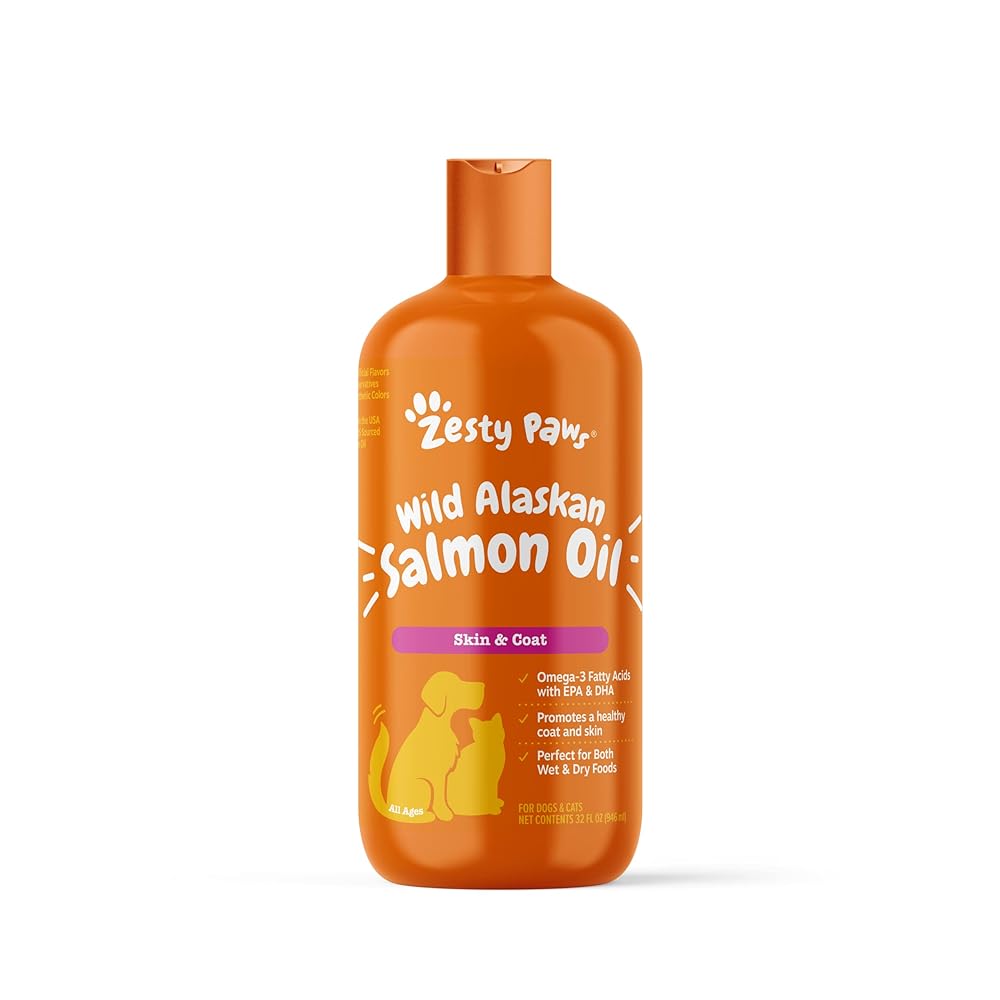
2. iHeartDogs Salmon Oil for Dogs and Cats
The iHeartDogs Salmon Oil for Dogs and Cats is a potent omega fatty acid source that supports a healthy immune system, heart health, and joint health and promotes healthy skin and coat. It provides dynamic health support, including allergy and itchy skin relief, while revitalizing dry and itchy skin and minimizing normal shedding. The salmon oil is sustainable, fully traceable, and made without GMOs, antibiotics, preservatives, or other additives. Additionally, purchasing this product also helps feed shelter dogs by providing 12 meals for them.
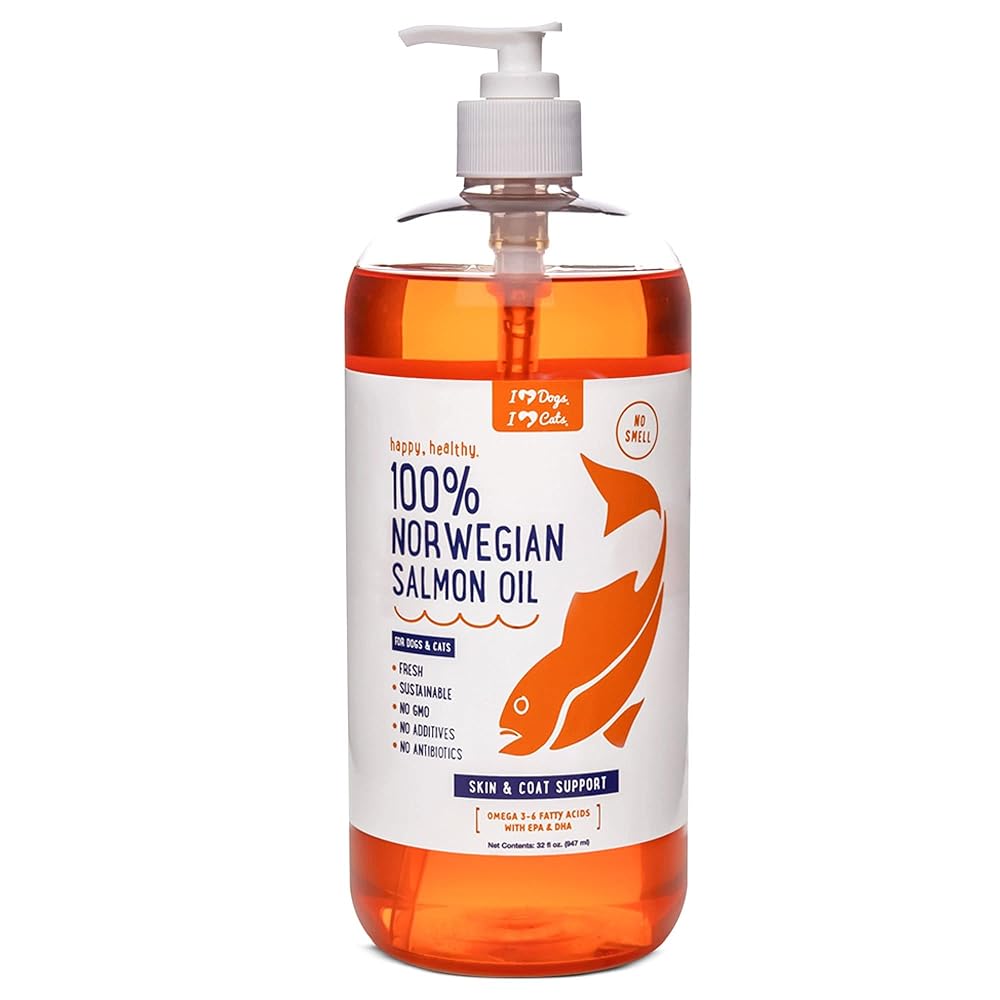
3. Solid Gold Fish Oil for Dogs & Cats
The Solid Gold Fish Oil for Dogs & Cats is a natural supplement that provides nourishment and support for the skin and coat of canine and feline pets. It contains a blend of wild-caught Alaskan salmon oil and pollock oil, which are rich in omega-3 fatty acids (EPA and DHA) to promote healthy skin and coats. Additionally, this supplement includes essential nutrients to support the immune system of pets. It can be easily added to any wet or dry food as a meal topper.
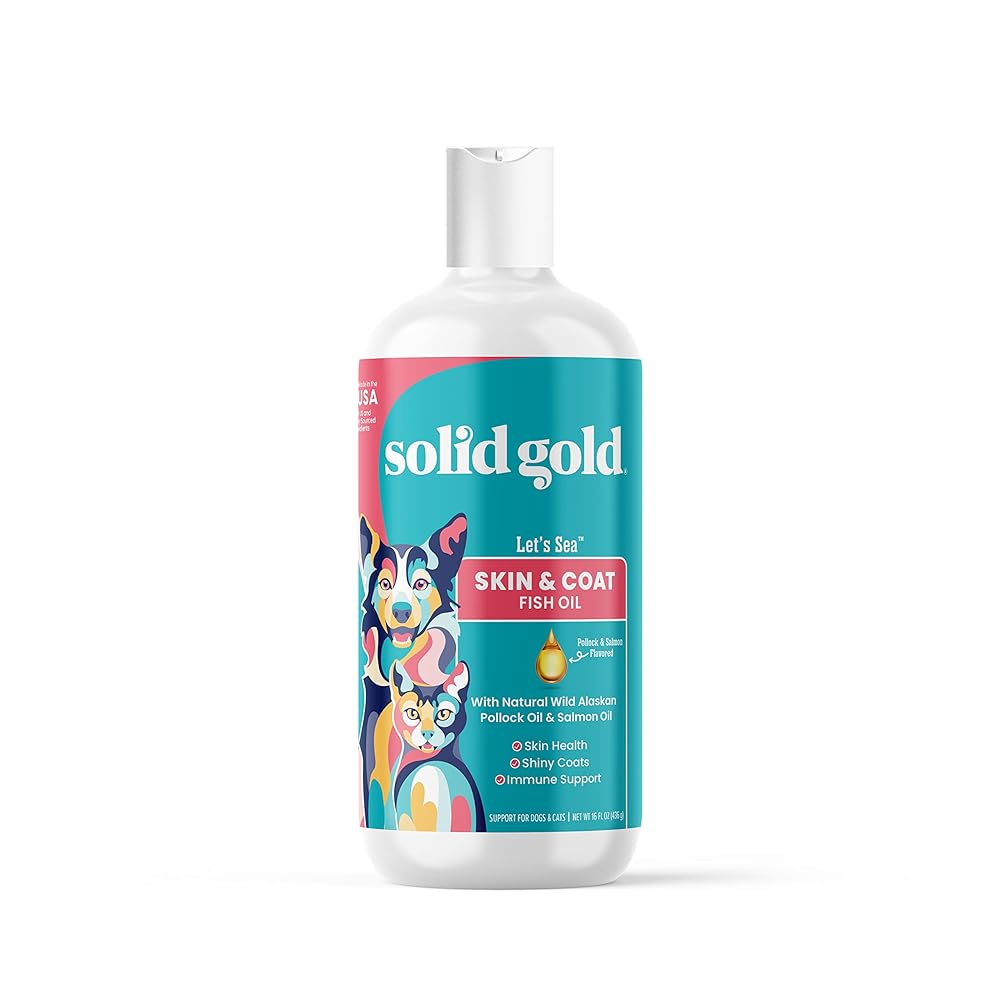
4. Salmon Oil for Dogs & Cats – Healthy Skin & Coat
This product is a 32 oz bottle of salmon oil liquid supplement for dogs and cats. It is designed to promote healthy skin and coat, support joint and bone health, and provide natural allergy and inflammation defense for pets. The omega-3 fatty acids in the salmon oil help improve the appearance and feel of the pet’s coat, reduce itching and scratching, and support joint mobility. The salmon used for the oil is sustainably sourced, ensuring the health of oceans and future seafood supplies. Additionally, this product is proudly made in the USA by a woman-owned small business.
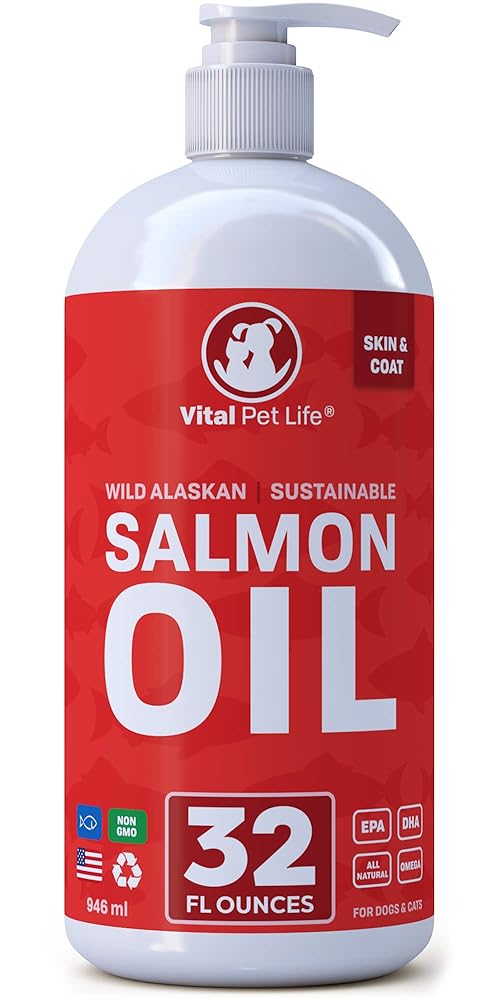
5. Zesty Paws Salmon Omega Oil Hemp for Dogs and Cats
Zesty Paws Salmon Omega Oil Hemp for Dogs and Cats is a product that combines Wild Alaskan Salmon Oil and Hemp Seed Oil to support skin health and immune function in pets. It contains Stearidonic acid (SDA) from Hemp Seed Oil, which may have immune-boosting properties for animals. Additionally, the inclusion of premium Wild Caught Alaskan Salmon Fish Oil provides Omega-3 Fatty Acids (EPA and DHA) for optimal skin health. This product aims to promote normal skin moisture content and overall cardiovascular health and immune system function in dogs and cats.
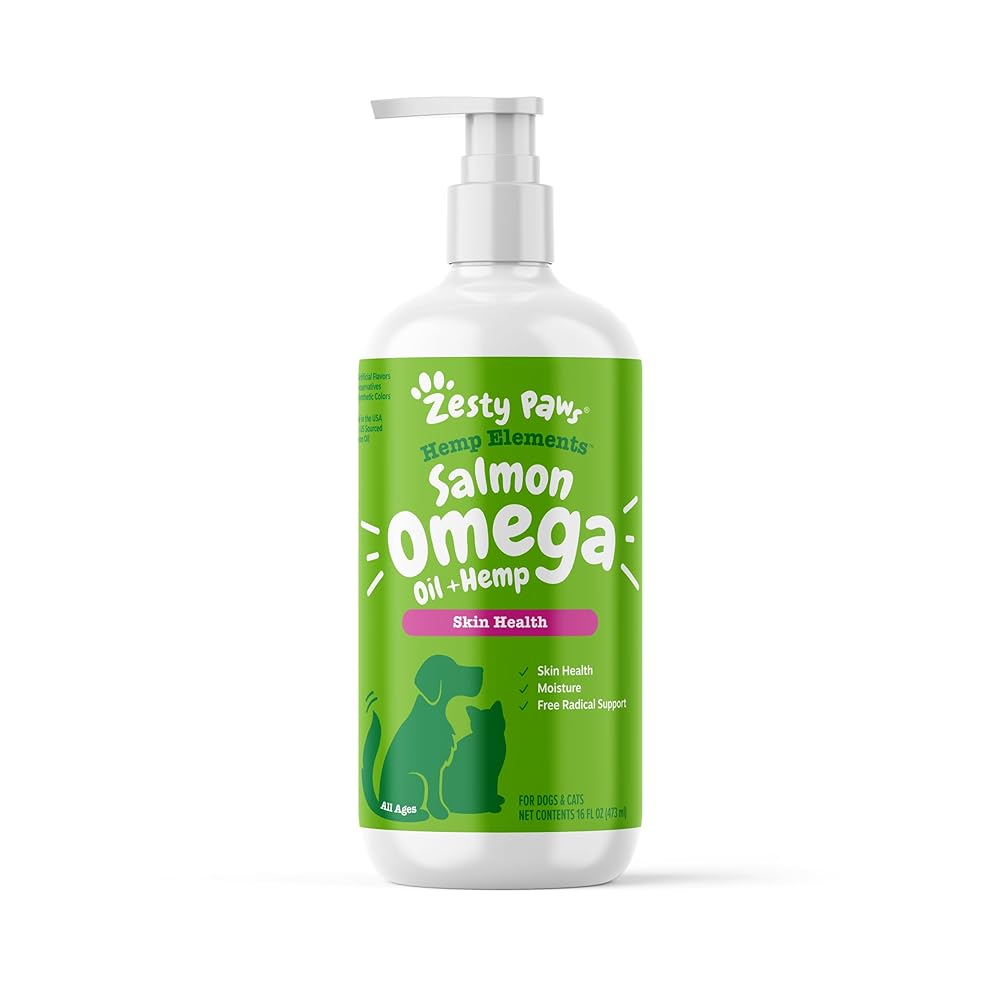
6. Nordic Naturals Omega-3 Pet, Unflavored – 2 oz – 304 mg
Nordic Naturals Omega-3 Pet is a fish oil supplement specially formulated for cats and small dogs. It contains high levels of omega-3 fatty acids, specifically EPA and DHA, which have been shown to support heart, skin, coat, joint, and immune health in pets. Nordic Naturals ensures the quality and purity of its product by using fresh, wild-caught fish and avoiding GMOs, gluten, dairy, artificial colors, flavors, and preservatives. They also prioritize sustainable and ethical practices in their manufacturing process.
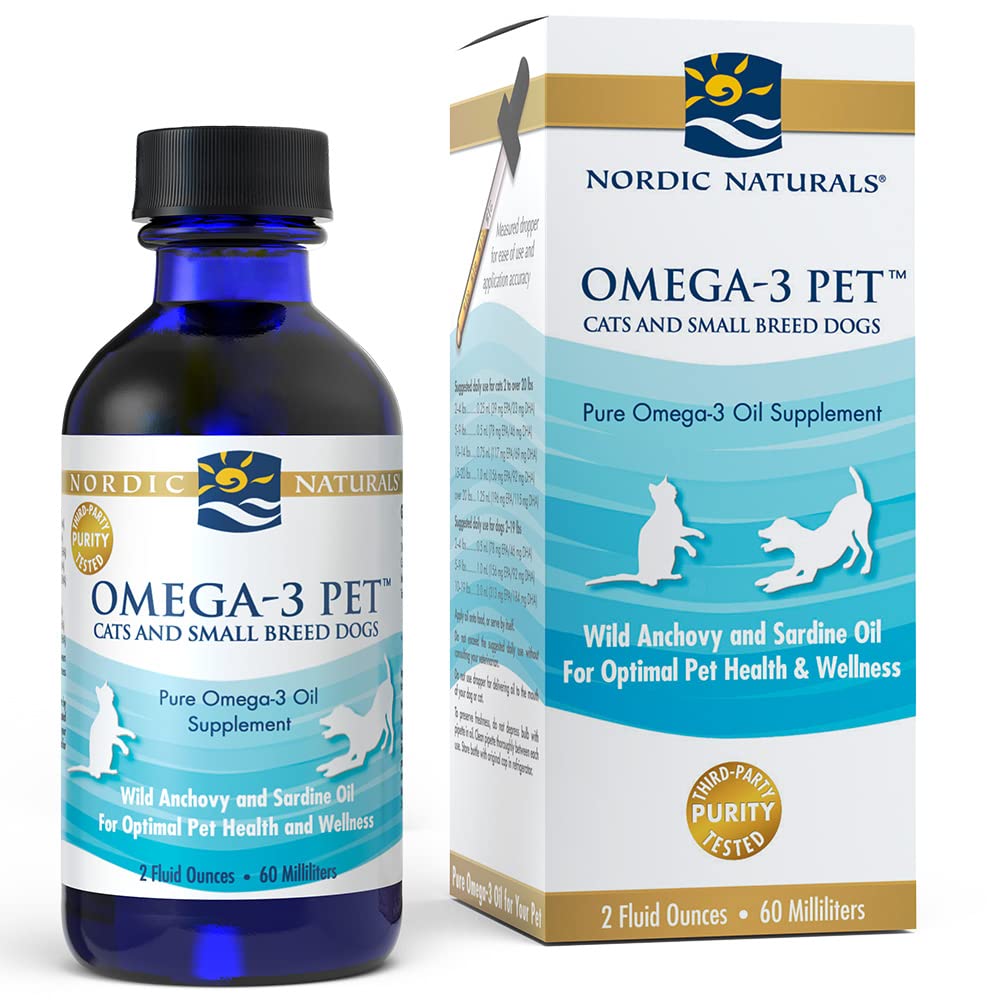
What’s Important When Choosing an Omega-3 for My Cat?
When choosing an Omega-3 supplement for your cat, several factors are essential to consider:
- Source of Omega-3: Ensure that the Omega-3 is derived from high-quality sources, preferably marine-based like krill, sardines, anchovies, or salmon. These sources provide EPA (eicosapentaenoic acid) and DHA (docosahexaenoic acid), the most beneficial types of Omega-3 for cats.
- Purity & Safety: The supplement should be free from contaminants like heavy metals, PCBs, and other toxins. Look for brands that perform third-party testing and provide a certificate of analysis.
- Formulation: Omega-3 supplements come in various forms, including liquid, soft gels, and chewables. Choose a form that’s easy to administer to your cat and is palatable for them.
- Dose: Ensure the supplement provides a suitable dose for cats. Too little won’t be effective, while too much can cause problems. Always follow the recommended dose on the label or consult with your veterinarian.
- Additives & Preservatives: Aim for supplements with minimal additives. Avoid products with artificial colors, flavors, or harmful preservatives.
- Stability & Expiry: Omega-3 oils can become rancid if not properly stored or if they’re past their expiry date. Check for products that contain antioxidants like vitamin E to maintain freshness and always check the expiry date.
- Sustainability: If possible, opt for brands that source their Omega-3s sustainably, ensuring minimal impact on marine ecosystems.
- Veterinarian’s Recommendation: Before introducing any supplement, it’s wise to discuss it with your vet. They may have specific brands or formulations they recommend based on your cat’s individual health needs.
By prioritizing these factors, you can ensure that the Omega-3 supplement you choose is both safe and beneficial for your cat’s overall health and well-being.
What Are The Benefits of Omega-3 Fish Oil for Cats?
Omega-3 fish oil offers a range of benefits for cats due to its anti-inflammatory properties and vital components, specifically EPA (eicosapentaenoic acid) and DHA (docosahexaenoic acid). Here are the primary benefits of Omega-3 fish oil for felines:
- Skin and Coat Health: Omega-3s can help reduce skin irritations and promote a shiny, healthier coat. They can also aid in alleviating symptoms associated with allergies and reduce dandruff.
- Joint Health: Omega-3s have anti-inflammatory properties that can help reduce the inflammation associated with conditions like arthritis, potentially providing relief to older cats or those with joint issues.
- Heart Health: Omega-3s support cardiovascular health by reducing triglycerides and blood pressure, and they also have anti-inflammatory properties beneficial for the heart.
- Brain and Vision Development: In kittens, DHA plays a critical role in the development of the brain and eyes. Providing adequate Omega-3 during pregnancy or to kittens can support cognitive and visual development.
- Kidney Function: Omega-3s can reduce the inflammation associated with kidney disease, helping in slowing the disease’s progression and improving the cat’s quality of life.
- Immune System Boost: Omega-3s can bolster the immune system, making it more effective in warding off diseases and infections.
- Anti-inflammatory Properties: Omega-3s help decrease the production of certain substances released during the inflammatory response, making them beneficial for cats with inflammatory conditions.
- Supports Digestive Health: They can assist in reducing inflammation of the gut, which can be beneficial for cats with inflammatory bowel disease (IBD) or other gastrointestinal disorders.
Incorporating Omega-3 fish oil into your cat’s diet can be a holistic approach to supporting their overall health. However, it’s always recommended to consult with a veterinarian before introducing any supplement to ensure it’s appropriate for your cat’s specific needs.
Frequently Asked Questions About Omega-3 Fish Oils for Cats
- What are the main sources of Omega-3s in fish oils for cats?
- The primary sources are marine-based, including krill, salmon, sardines, and anchovies. These sources are rich in EPA (eicosapentaenoic acid) and DHA (docosahexaenoic acid), the most beneficial Omega-3s for felines.
- Can I give my cat human Omega-3 supplements?
- It’s essential to use supplements formulated for cats as human supplements might have a higher dosage or contain additional ingredients not suitable for felines. Always consult with a veterinarian before giving any supplements.
- How do I administer Omega-3 oil to my cat?
- Many Omega-3 supplements for cats come in liquid form that can be drizzled over their food, while others are available as capsules or chewable treats. Choose a method that your cat prefers and tolerates.
- Are there any side effects to giving my cat Omega-3s?
- While generally safe, some cats might experience diarrhea or indigestion, especially when introduced in large amounts suddenly. Start with a smaller dose and gradually increase as recommended.
- How often should I give Omega-3 supplements to my cat?
- The frequency depends on the specific product and your cat’s health needs. Follow the instructions on the label and consult with your vet for a tailored recommendation.
- What’s the difference between Omega-3 and Omega-6?
- Both are essential fatty acids, but they serve different functions. Omega-3s are anti-inflammatory and support various health aspects, while Omega-6s are more prevalent in plant oils and can promote inflammation when consumed in excess.
- Can kittens benefit from Omega-3 supplements?
- Absolutely! DHA, a component of Omega-3s, plays a crucial role in brain and vision development in kittens. However, always ensure the dosage is appropriate for a younger cat.
- How do I ensure the Omega-3 supplement is of good quality?
- Opt for reputable brands that source sustainably and conduct third-party testing. Ensure the product is free from contaminants and check for a certificate of analysis when available.
- Do Omega-3 supplements expire?
- Yes, Omega-3 oils can become rancid over time. Always check the expiration date, store the product as recommended, and use it within the specified timeframe.
- Can Omega-3 fish oil help with my cat’s allergies?
- Omega-3s can alleviate symptoms associated with allergies due to their anti-inflammatory properties. They can reduce skin irritations and promote a healthier coat, providing relief from some allergic reactions.
Final Summary: The Best Omega-3 Supplements for Cats
In this article, we reviewed the Best Omega-3 Supplements for Cats, emphasizing the numerous health benefits they provide, from improved skin and coat quality to enhanced cognitive and joint health. Ensuring your cat receives the right Omega-3 supplement can play a pivotal role in their overall well-being. As always, before introducing any supplement into your cat’s diet, consulting with a veterinarian is recommended. Armed with the right knowledge and products, you can ensure your feline companion enjoys a vibrant, healthy life.

